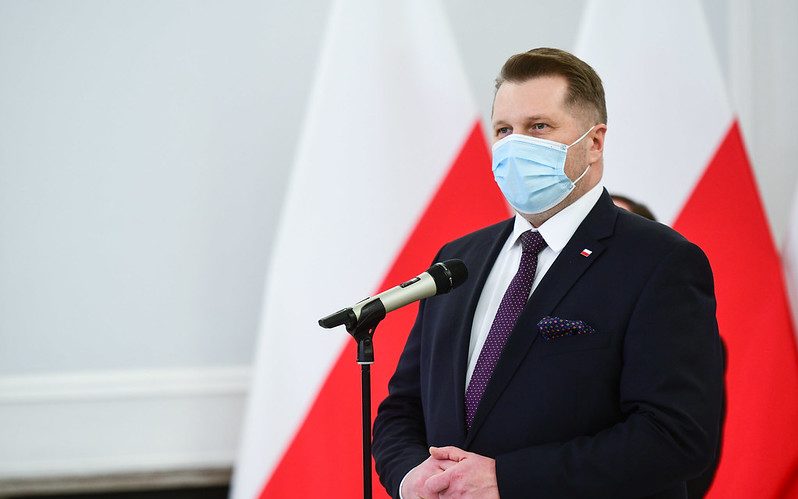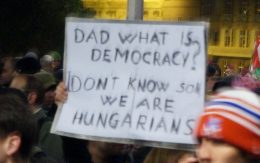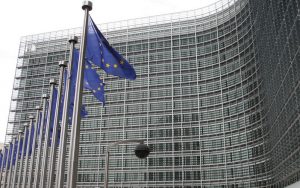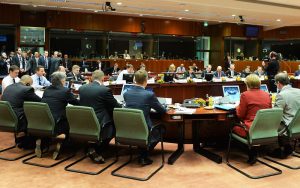According to OKO press, a polish investigative journalism website, 64 percent of young people would “prefer to live and work in a country other than Poland” (Danielewski, 2020). There are of course many, diverse reasons for this, the positive ones being the increasing popularity of the digital or nomadic lifestyle, the opportunities of studying abroad (mostly in the EU), or the sheer lust for novelty and adventure. Nevertheless, many of the respondents also mention the current political, social and economic atmosphere as a reason for wanting to leave Poland and permanently settle in another country. What are thus the economic and social challenges that young people must currently face? And what visions of the future is the government laying in front of them? This article will analyse these questions by focusing on three, currently most widely discussed, fields: education, energy industry and freedom.
EDUCATION
Up to date, the debate about education was mostly centred on schools, where the present Minister of Education, Przemyslaw Czarnek, is continuously not only implementing his conservative ideas through directly altering current curricula to include more patriotic or religious content but also openly stating his homophobia, antisemitism and disapproval of other political viewpoints (Szpyrka, 2020). Recently, however, which has a more direct impact on the immediate future of the younger generation, Czarnek has become increasingly involved in reforming higher education structures (Otfinowska, 2020). His plan, with the help of many right-wing assistants appointed by Czarnek himself, is to give more space, voice and freedom to right-wing, Christian and conservative opinions and representatives. The recently introduced aims include giving more credit or recognition to ultra-catholic and nationalistic academic publications, organising more meetings and conferences for right-wing and catholic societies, polarizing fields of studies through giving more value to ones, which answer to Czarnek’s own views and the views of the current ruling party PiS and getting involved with doctorial schools (Sewastianowicz, 2021). These reforms are widely criticised by many experts and universities and thus are met with a lot of opposition. Nevertheless, these opinions are not strong enough to counteract the ongoing reforms and young people are faced with uncertainty about their future for years to come. This is not only because the autonomy and diversity of academia is under threat, but also because the changes bring a lot of disorganisation and multiple agreements, which affect study courses, long-term research and put into question the future independence and progressivism of higher education institutions (Leszczyński, 2020).
ENERGY INDUSTRY
Another big topic worth mentioning with regard to the future of young people in Poland is the reforms that are taking place in the country’s energy industry, given that they will have an enormous and long-term impact on not only the economic markets but also the cultural or social spheres and thus the every-day life. Historically the country’s main source of energy was coal (both brown and stone) and a huge part of the traditions, customs, lifestyles, jobs, university degrees, family relations and much more was developed in accordance with the existence of coal and the absolute reliability on this resource (Pierzynski, 2020). The situation is however inevitably changing not only because of the decreasing availability of coal in mines, but also decarbonisation processes and availability of innovative environmentally friendly technology.
Now, the sole aspect of needing to reconstruct the current energy infrastructure in itself is not a negative development, however the way it is being handled in Poland is a reason for concern. In a recent conversation with RMF FM, a well-known radio station, Piotr Naimski, a minister for strategic energy infrastructure, claims that even though the predicted availability of coal ends already in 2030, the country currently has no secure and clear strategy when it comes to which alternative sources of energy to adopt, who would Poland’s partners be and how to get and distribute funding (Mazurek, 2021). Such big changes should be planned on a long-term basis and, especially in a country where such a huge part of the economy and infrastructure is adapted on the present-day energy production, the lack of a clear perspective leads to the apprehension of price increases, unemployment and recession, thereby also leading to all the social issues stemming from these effects.
It is thus clear that the disorderly way in which the energy industry is being altered in Poland affects young people; it has and will continue to have a huge impact on social well-being and economic opportunities. And the challenges connected with this fact are already being felt for example in Jastrzębie-Zdrój, a city in Silesia which is one of the biggest coal-mining regions in Poland and is currently undergoing the process of liquidation of coal mines and setting up a completely new strategy for its future (JastrzebieOnline, 2021). The city’s president, Anna Hetman, claims that the current situation is very difficult as it relies on external funding from the EU but also the Polish government, which at the present moment “gives no reply in reference to concrete demands”. When asked about the younger generation or current miners, Hetman claims there is a constant influx of innovative, but not concrete ideas. She also introduces the prospect of retraining citizens to work for the IT or tourism branches, before admitting that it not only relies on external investors and outsourcing of work but is also currently unsure due to the reluctance of many companies to invest in areas ruined by mining (Jasnorzewski, Pawłowicki and Zygiel, 2021).
The local and regional authorities as well as the ruling government have up to date not presented any comprehensive strategies and do not seem to reach agreements through collaboration, thus, considering that the transformation of the energy industry is in fact a social process, affecting branches far beyond mining itself, the occurring uncertainty has an impact on people’s decision to commit to a country and make long-term plans.
FREEDOM and HUMAN RIGHTS
The handling of freedom and human rights in Poland is unfortunately a very current affair, however, due to its complexity and wide span, the article will focus only on women’s rights and the free media, the two most recent topics of interest.
The former is connected with the recently introduced abortion ban, which severely aggravated the already strict abortion law, making it impossible for a woman to make her own decision with regards to pregnancy and childbearing (TVN24, 2021). The repercussions and consequences of the introduction of this law are however more complex than it seems, especially when referring to the future of young people. The decision was made by the current government, who in any case makes it clear to be right-wing, nationalistic, ultra-catholic and conservative and is therefore openly criticized by the society that is more liberal in their views and thus keen on finding a potential alternative. What is hence concerning is that there is currently no ‘potential alternative’ strong enough to counteract the activities of the current government. The opposition had a vague response and indecisive methods of counteracting the ban and expressing their own supportive opinion (TVN24, 2021) and in general avoid giving direct answers about their stance on issues such as woman’s rights, but also, to put it in a wider context, on same-sex marriage or immigration (Pawlowski, 2017).
This lack of an entity that would strongly voice alternative views hinders young people’s hope for a more open-minded, diversified and permissive future. What furthermore deepens this issue is the recent governmental attempts to obstruct the work and existence of free media. In March 2021, PKS Orlen, a state-owned oil company has bought Polska Press, which owns hundreds of local newspapers and websites, in an attempt to “re-polonize” the media (Wilczek, 2021). In addition, the government has drafted a policy, which would require independent media to pay an additional tax on the profit they make from advertising (money.pl, 2021). Considering that, unlike state television, independent media are not supported financially by the government, this decreases their potential income and threatens their further activity, which is vital to providing unconstrained and autarchic information to all.
Poland is in the process of working on the issues mentioned above and some other ones, such as scandals in the Catholic Church, Police brutality or corruption. The country is still not homogenized enough not to have voices of opposition, however, if this state of precariousness is prolonged, it will have an immense impact on future generations and their decision-making processes.
Sources
Danielewski, M., 2020. Sondaż, który szokuje: 64 proc. młodych “wolałoby żyć i pracować w innym kraju niż Polska”. [online] oko.press. Available at: <https://oko.press/sondaz-ktory-szokuje-64-proc-mlodych-chcialoby-zyc-za-granica/).> [Accessed 5 March 2021].
Jasnorzewski, J., Pawłowicki, K. and Zygiel, A., 2021. Hetman: Jak na Śląsku nie uda się transformacja, to nigdzie się nie uda. [online] Rmf24.pl. Available at: <https://www.rmf24.pl/tylko-w-rmf24/popoludniowa-rozmowa/news-hetman-jak-na-slasku-nie-uda-sie-transformacja-to-nigdzie-si,nId,5081933> [Accessed 5 March 2021].
JastrzebieOnline, 2021. Jastrzębie-Zdrój najgorzej zniesie likwidację kopalń. [online] JastrzebieOnline.pl. Available at: <https://jastrzebieonline.pl/news,16169,jastrzebie-zdroj-najgorzej-zniesie-likwidacje-kopaln.html> [Accessed 5 March 2021].
Leszczyński, A., 2020. Krucjata Czarnka. Chce walczyć z “dominacją światopoglądu lewicowo-liberalnego na uczelniach”. [online] oko.press. Available at: <https://oko.press/krucjata-czarnka-napotyka-opor-naukowcy-to-wpajanie-swiatopogladu-religijnego/> [Accessed 5 March 2021].
Mazurek, R., 2021. Piotr Naimski: Pierwsza polska elektrownia atomowa? Na Pomorzu Gdańskim. [online] Rmf24.pl. Available at: <https://www.rmf24.pl/tylko-w-rmf24/poranna-rozmowa/news-piotr-naimski-pierwsza-polska-elektrownia-atomowa-na-pomorzu,nId,5081957> [Accessed 5 March 2021].
Otfinowska, S., 2020. Minister Czarnek: ruszają prace nad nowelizacją ustawy – Portal edukacyjny Perspektywy. [online] Perspektywy.pl. Available at: <http://perspektywy.pl/portal/index.php?option=com_content&view=article&id=5261&catid=24&Itemid=119> [Accessed 5 March 2021].
money.pl, 2021. Podatek od mediów. Morawiecki przekonuje: nie uderzy w medialny pluralizm. [online] www.money.pl. Available at: <https://www.money.pl/podatki/podatek-od-mediow-morawiecki-przekonuje-nie-uderzy-w-medialny-pluralizm-6607811326618304a.html> [Accessed 5 March 2021].
Pawlowski, L., 2017. Małżeństwa homoseksualne to postulat konserwatywny. [online] Kultura Liberalna. Available at: <https://kulturaliberalna.pl/2017/07/10/dehnel-tarczynski-wywiad-malzenstwa-homoseksualne> [Accessed 5 March 2021].
Pierzynski, A., 2020. Perzyński: O historii węgla, czyli surowca, który zmienił wszystko – BiznesAlert.pl. [online] BiznesAlert.pl. Available at: <https://biznesalert.pl/wegiel-wydobycie-historia-energetyka/> [Accessed 5 March 2021].
Sewastianowicz, M., 2021. W drugiej połowie stycznia rekomendacje dla zmian w uczelniach. [online] Prawo.pl. Available at: <https://www.prawo.pl/student/zmiany-na-uczelniach-wyzszych-w-2021-zapowiedz-ministra-czarnka,505623.html> [Accessed 5 March 2021].
Szpyrka, L., 2020. Reformy edukacji do kosza? Mocne otwarcie Czarnka. [online] Wydarzenia.interia.pl. Available at: <https://wydarzenia.interia.pl/autor/lukasz-szpyrka/news-przemyslaw-czarnek-ostro-zabral-sie-do-pracy-co-z-reformami-,nId,4850720> [Accessed 5 March 2021].
tvn24, 2021. “To jest po prostu kabaret konstytucyjny pod wezwaniem pani magister Przyłębskiej”. [online] TVN24. Available at: <https://tvn24.pl/polska/wyrok-trybunalu-konstytucyjnego-w-sprawie-aborcji-komentarze-politykow-5002875> [Accessed 4 February 2021].
tvn24, 2021. “Pis zaczyna wojne, ktora przycmi wszystko. To bedzie huragan”. [online] TVN24. Available at: <https://tvn24.pl/magazyn-tvn24/pis-zaczyna-wojne-ktora-przycmi-wszystko-to-bedzie-huragan,135,2428> [Accessed 4 February 2021].
Wilczek, M., 2021. Polish state oil giant completes media takeover as editor promises to defend independence. [online] Notes From Poland. Available at: <https://notesfrompoland.com/2021/03/02/polish-state-oil-giant-completes-media-takeover-as-editor-promises-to-defend-independence/> [Accessed 5 March 2021].








Be First to Comment